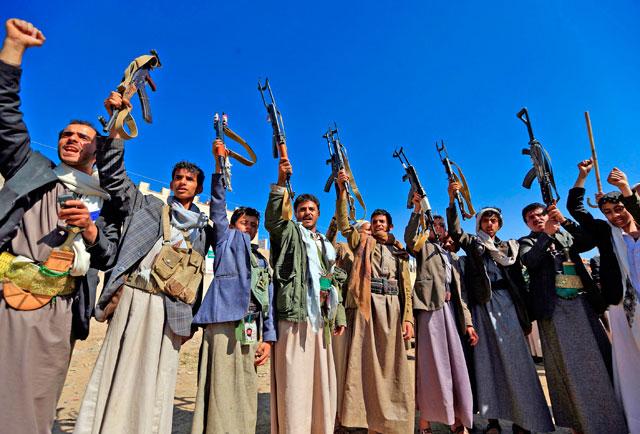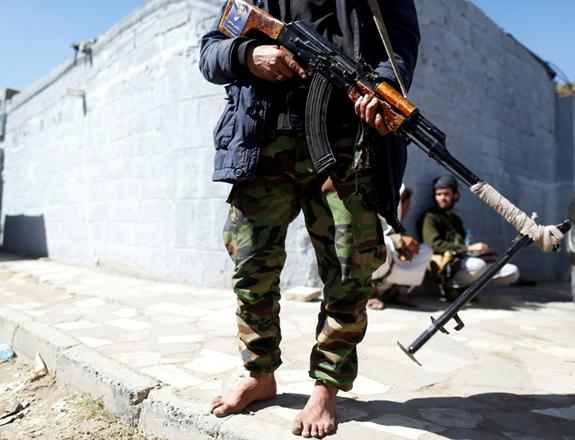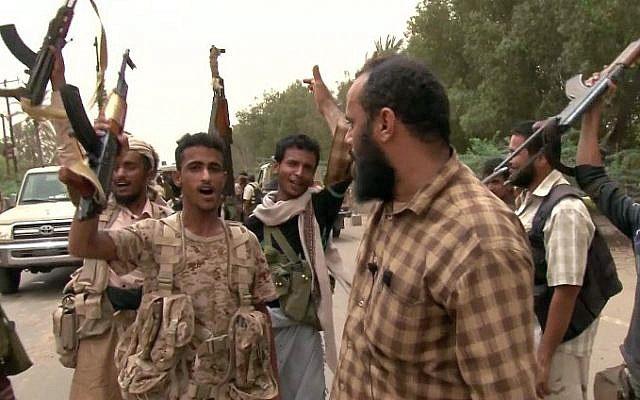You are here
Yemen’s warring parties agree Hodeida ceasefire at UN talks
By AFP - Dec 14,2018 - Last updated at Dec 14,2018

Armed Yemeni men brandish their weapons as they gather in the capital Sanaa to show their support to the Shiite-Houthi movement against the Saudi-led intervention on Thursday (AFP photo)
RIMBO, Sweden — Yemen’s warring parties on Thursday agreed to a ceasefire on a vital port in a series of breakthroughs in UN-brokered peace talks that could mark a major turning point after four years of devastating conflict.
If implemented, the deal on the Hodeida port, a key gateway for aid and food
imports, could bring relief to a country where 14 million people stand on the brink of famine.
In a highly symbolic gesture on the seventh and final day of the peace talks in Sweden, Yemeni Foreign Minister Khaled Al Yamani and rebel negotiator Mohammed Abdelsalam shook hands to loud applause — although both later voiced scepticism.
The two leaders gave contradictory readings of the Hodeida deal shortly after the announcement by UN chief Antonio Guterres.
The week-long talks left a number of key issues unresolved.
A new round of talks is scheduled for the end of January, with analysts predicting the US will continue to up the pressure on ally Saudi Arabia, a key backer of the Yemen government, to end the conflict.
Impoverished Yemen has been mired in fighting between Iran-backed Houthi rebels and troops loyal to President Abed Rabbo Mansour Hadi since 2014. But the war escalated in 2015 when a Saudi-led military coalition stepped in on the government’s side.
Under the Hodeida agreement, released on Thursday evening, an “immediate ceasefire” should come into effect in Hodeida and its three ports upon signing, followed by a “mutual redeployment of forces... to agreed upon locations outside the city and the ports”.
The UN will play a “leading role” in management and inspections at the ports, for four years under rebel control. The port will eventually be under the control of “local security forces” — a term the rival parties disagree on.
Yemeni Foreign Minister Khaled Al Yamani, who agreed to the deal in Sweden, declined to specify whether the forces would be solely state security forces but told AFP they would report to the “central authority” — the government.
But the head rebel negotiator told AFP the phrase referred to the “security forces currently present in Hodeida” — the rebels.
Saudi Arabia and its allies accuse the rebels of arms smuggling from Iran through Hodeida and the capital Sanaa, charges Iran has denied. The Saudi led-military coalition currently controls Yemen’s maritime borders and airspace.
UN chief Guterres said the rivals had also reached a “mutual understanding” on Yemen’s third city of Taiz, the scene of some of the most intense battles in the conflict, to facilitate the delivery of aid. No further details were given.
No deal has been reached on the future of the airport in the capital Sanaa or on economic measures needed to spare the population from further hunger.
Sanaa airport has been closed to commercial flights for nearly three years. The airport will be discussed at the next round of talks, UN Special Envoy Martin Griffiths said.
Foreign Minister Yamani said the deal was the biggest step forward since the outbreak of the war but remained “hypothetical”. “We will wait and see,” he told AFP.
The rebels’ Abdelsalam told AFP his group was “bound by an agreement”.
Analysts said the Rimbo talks progressed better than anticipated, two years after the last negotiations hosted by Kuwait in 2016 collapsed with no breakthrough after three months.
“The Sweden talks have achieved more than anyone expected,” the International Crisis Group told AFP.
“We have heard a different tone from the government of Yemen in these talks, and US pressure has clearly focused minds in the Gulf.”
The case of murdered Saudi journalist Jamal Khashoggi, along with the humanitarian crisis in Yemen, were the turning point for the US.
The US, Britain and France are still the biggest arms sellers to Saudi Arabia.
Both the rebels and government alliance are accused of failing to protect civilians. The UN last year blacklisted the Saudi-led coalition for the killing and maiming of children in air raids.
The US Senate on Wednesday voted to advance a resolution that ends backing for the Saudi-led intervention by 60 votes to 39, with 11 Republicans joining Democrats to back the measure.
If the upper house approves the resolution, it is likely to run aground in the final vote on Thursday in the lower House of Representatives, where Republicans hold the majority until January 3. US President Donald Trump has veto right.
The Yemen ambassadors of core players in the conflict, including Saudi Arabia and the UAE, were in Rimbo for the last day of negotiations. British Foreign Secretary Jeremy Hunt also met with both the government and rebels on Thursday.
Saudi Arabia and its Arab coalition partners “strongly support” the agreement reached on Yemen, Riyadh’s US Ambassador Khalid Bin Salman said.
“The agreement announced today will help bring back security to the region including the security of the Red Sea, a vital water way for international trade,” the envoy, who is the brother of Crown Prince Mohammed Bin Salman, said on his Twitter account.
“The agreement is a major step towards alleviating the humanitarian crisis and reaching a political solution.”
Related Articles
RIMBO, Sweden — The Yemeni city of Hodeida, home to both a valuable port and frontlines, has proved the most complex issue at UN-sponsored p
RIMBO, Sweden — Yemen’s Saudi-backed government is willing to accept a UN role in Hodeida’s seaport, a lifeline for millions of people durin
RIMBO, Sweden — Yemen's government and rebels, locked in a devastating war for years, traded mutual accusations on Thursday as they sat down




















